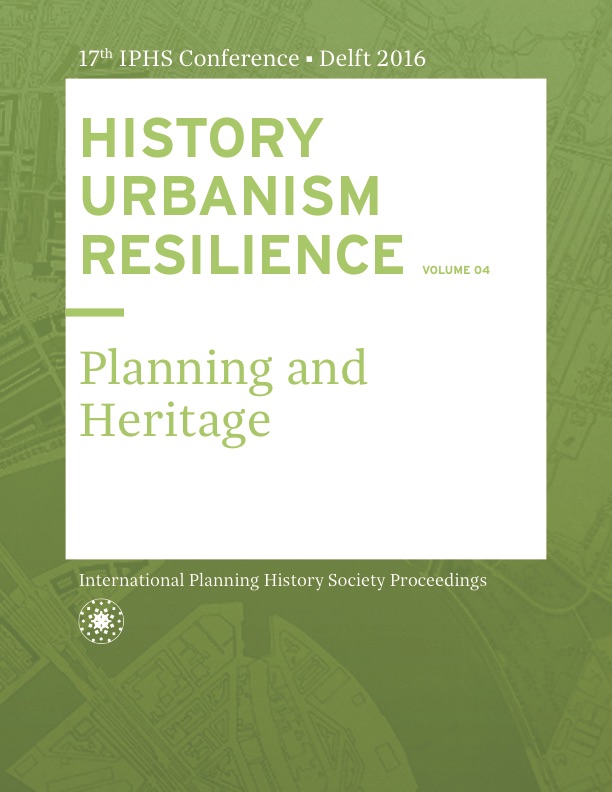Urban Form, Water and Green Spaces: Towards an Integrated aproach of resilient urban systems.
DOI:
https://doi.org/10.7480/iphs.2016.4.1306Abstract
Urban Planning has been engaged for a long time with a main issue: how to plan the expansion of cities. Indeed, since Ildefonso Cerdà with its ensanche for Barcelona, to Sola-Morales ‘Forms of Urban Growth’ the discipline of urban planning has not abandoned Cerdà main idea based on how to persistently expand the city.Based on a review of the different authors and theories of urban planning, that have shaped the urban history of XXth century, this presentation would like to offer a reflection on i) why did the expansion of cities theory emerged?; ii) why it is declining now?, iv) how should urban planning interpret this change?; and finally v) what contributions of these lessons can we take to improve our cities and territories and transform them in more resilient places?
The main aim of this presentation is to determine why have such expanding theory emerged and why it is not working any longer. To do that it will offer an analysis of the urban metabolism of present society and relate it to the consequences generated by the implementation of the ‘expansion’ theory. Secondly, it will evaluate what does urban metabolism has to do with the urban form arrangements, people distribution within the territory, and urban infrastructures (water and green spaces in particular).
This presentation exposes its analysis throughout a detailed examination of the urban planning options taken by urban planning authorities for Lisbon and its region during twentieth century, in particular in what relates to urban form, water infrastructures and green spaces. Moreover, it evaluates how society itself has assimilated the relationship of urban form, water and green spaces over time. Further evaluation of such urban planning options, in terms of urban metabolism analysis, will contribute to compare Portuguese Urban Planning approaches (in particular those followed in Lisbon and its Regional Area) against other European Cities of the time, while attempting to take some lessons of urban form versus urban resilience.
Finally, this presentation argues that to transform our cities into more resilient places it is important that Urban Form should be recognized as a strategic tool to transform the current metabolic functioning of our cities. However that will only be possible when a better understanding of the integral role of urban form itself is recognized by society.
References
Abrantes, Emídio. Elementos para o estudo do plano de urbanziação da cidade de Lisboa. Lisboa: Camara Municipal de Lisboa. Direcção dos serviços de urbanziação e obras. 1938.
Alier, J. M., Schlupmann, K. La ecología y la economia. Madrid: Fondo de Cultura Económica, 1992.
Barles, Sabine, “Urban Metabolism and river systems: an historical perspective – Paris and Seine, 1790-1970”. Hydrology and Earth System Sciences 11 (2007): 1757-1769.
Bell, Sarah and Teh, Tse-Hiu. “People, pipes and places” In Networks of Design: Proceedings of the 2008 Annual International Conference of the Design History Society (UK), edited by F. Hackney, J Glynne and VIV Minton, VIV, 19-23. UK: Universal Publishers.
Cerdà, Ildefonso. Teoría de la construccíon de las ciudades. Cerdà y Barcelona. Vol.1. Madrid: Ministerio para las Administraciones Públicas. Secretaría General Técnica. Instituto Nacional de Administración Pública: Ayntamiento de Madrid, Ajuntament de Barcelona, 1859 [1991].
Cerdà, Ildefonso. Teoría de la construccíon de las ciudades. Cerdà y Barcelona. Vol.2. Madrid: Ministerio para las Administraciones Públicas. Secretaría General Técnica. Instituto Nacional de Administración Pública: Ayntamiento de Madrid, Ajuntament de Barcelona, 1861 [1991].
Cerdà, Ildefonso. Teoría general de la urbanización y aplicación de sus principios y doctrinas a la reforma y ensanche de Barcelona. Madrid: Imprenta Española, 1867 [Estudios Fiscales, 1968-1971.]
Fischer-Kowslosky, Marina. “Society’s Metabolism The Intellectual History of Materials Flow Analysis, Part I, I860- I970” Journal of Industrial Ecology 2 (1) (1998): 61-78.
Font, António (ed.), Llop, Carles; Bernadó, Jordo; L’explosión de la ciudad: Morfologies, mirades i mocions sobre las transformaciones territoriales recents en las regiones urbanas de la Europa Meridional (Barcelona: COAC Publicationes, Forum Universal de Les Cultures Barcelona, 2004).
Gandy, Matthew. “Rethinking urban metabolism: Water, space and the modern city.” City 8 (3) (2004): 363-379.
Groer, Étienne de. “Nota introdutiva” in Plano Director da Cidade. Lisboa: CML (1948): 1.
Groer, Étienne de. “Introdução ao Urbanismo” in Boletim da direcção Geral dos Serviços de Urbanziação I Volume. Lisboa: Ministério das Obras Públicas (1945-1946): 17-86.
Marat-Mendes, Teresa. “The sustainable urban form: a comparative study in Lisbon, Edinburgh and Barcelona” PhD diss., The University of Nottingham, 2002.
Marat-Mendes, Teresa and Oliveira, Vítor. “Urban planners in Portugal in the middle of the twentieth century: Étienne de Groër and Antão Almeida Garrett”. Planning Perspectives 28 (2013): 91-111.
Marat-Mendes, Teresa; Mourão, Joana; Bento d’Almeida, Patrícia. “Access to water in the Lisbon region in 1900” Water History. DOI 10.1007/s12685-016-0160-3 (2016). 1-31.
Mathus, Thomas. An Essay on the Principle of Population (Oxford: Oxford University Press, (2008)[1798]).
Niza, Samuel; Ferreira, Daniela; Mourão, Joana; Bento d’Almeida, Patrícia; Marat-Mendes, Teresa. “Lisbon’s womb: an approach to the city metabolism in the turn to the twentieth century” Regional Environmental Change. Doi: 10.1007/s10113-015-0918-7 (2016). 1-13.
Saraiva, Tiago; Schmidt, Luísa; Pato, João, “Lisbon Water Regimes: Politics, Environment, Technology and Capital (1850-2010)”, Flux 97-98 (2014): 60-79.
Smith, Adam. An Inquiry into the Nature and Causes of the Wealth of Nations (University of Chicago Press, (1977) [1776]).
Solà-Morales i Rubió, Manuel. Las formas de crescimento urbano. Barcelona: Edicions UPC, 1997 [2003].
“Um plano de realizações”. Diário de Lisboa, 24.2.1933. [available in http://www.fmsoares.pt/aeb_online/visualizador.php?bd=IMPRENSA&nome_da_pasta=05751.015.04196&numero_da_pagina=4]

